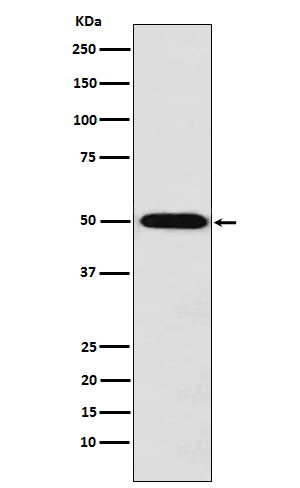
| WB | 1/500-1/1000 | Human,Mouse,Rat |
| IF | 咨询技术 | Human,Mouse,Rat |
| IHC | 咨询技术 | Human,Mouse,Rat |
| ICC | 技术咨询 | Human,Mouse,Rat |
| FCM | 咨询技术 | Human,Mouse,Rat |
| Elisa | 咨询技术 | Human,Mouse,Rat |
| Aliases | HHF7; MCT 1; MCT; Slc16a1 |
| Entrez GeneID | 6566 |
| WB Predicted band size | Calculated MW: 54 kDa; Observed MW: 54 kDa |
| Host/Isotype | Rabbit IgG |
| Antibody Type | Primary antibody |
| Storage | Store at 4°C short term. Aliquot and store at -20°C long term. Avoid freeze/thaw cycles. |
| Species Reactivity | Human |
| Immunogen | A synthesized peptide derived from human Monocarboxylic acid transporter 1 |
| Formulation | Purified antibody in PBS with 0.05% sodium azide. |
+ +
以下是关于 Monocarboxylic Acid Transporter 1 (MCT1) 抗体的3篇参考文献,简要概括如下:
1. **"Monocarboxylate transporters in the central nervous system: distribution, regulation and function"**
- **作者**: Halestrap, A.P., et al.
- **摘要**: 本文综述了MCT1在中枢神经系统中的表达模式,利用特异性抗体定位其在内皮细胞和神经元中的分布,并探讨了其在乳酸转运和能量代谢中的作用。
2. **"Role of MCT1 in the metabolic adaptation of cancer cells to the tumor microenvironment"**
- **作者**: Kirk, P., et al.
- **摘要**: 通过免疫组织化学和Western blot实验(使用MCT1抗体),研究揭示了肿瘤细胞中MCT1的高表达与其依赖乳酸代谢的关联,提示其作为潜在治疗靶点。
3. **"Immunolocalization of monocarboxylate transporters in the mouse blood-brain barrier"**
- **作者**: Pierre, K., et al.
- **摘要**: 使用MCT1抗体进行免疫荧光染色,发现MCT1在血脑屏障内皮细胞中高度富集,支持其在脑内乳酸和酮体跨膜运输中的关键作用。
4. **"MCT1-mediated transport of lactate in cultured neurons and astrocytes"**
- **作者**: Murray, C.M., & Pellerin, L.
- **摘要**: 通过抗体标记和功能实验,验证了MCT1在神经元和星形胶质细胞中的差异表达,强调了其在神经细胞间乳酸穿梭中的生理意义。
以上文献均通过MCT1抗体进行蛋白定位或功能研究,涉及神经系统、肿瘤代谢及细胞能量调控等领域。
The Monocarboxylic Acid Transporter 1 (MCT1), encoded by the *SLC16A1* gene, is a transmembrane protein responsible for the proton-coupled transport of monocarboxylates such as lactate, pyruvate, and ketone bodies across cell membranes. It plays a critical role in cellular metabolism, particularly in tissues with high energy demands or under hypoxic conditions, including skeletal muscle, erythrocytes, and the blood-brain barrier. MCT1 facilitates lactate shuttling between cells, supporting metabolic coupling in processes like the Cori cycle and the astrocyte-neuron lactate shuttle.
Antibodies targeting MCT1 are widely used in research to study its expression, localization, and function in physiological and pathological contexts. These antibodies enable techniques such as Western blotting, immunohistochemistry (IHC), and immunofluorescence (IF) to detect MCT1 in various species, including humans, mice, and rats. Specific MCT1 antibodies often recognize epitopes in the cytoplasmic N- or C-terminal regions or extracellular loops, with validation typically involving knockout controls or siRNA-mediated knockdown to confirm specificity.
Research applications span cancer biology (e.g., tumor metabolism), neuroscience (e.g., metabolic support in neurodegenerative diseases), and exercise physiology (e.g., lactate transport in muscle). Dysregulation of MCT1 is linked to cancer progression, metabolic disorders, and neurological conditions, making it a therapeutic target. Antibodies thus serve as essential tools for elucidating MCT1's role in health and disease, guiding drug development, and diagnostic biomarker discovery.
×